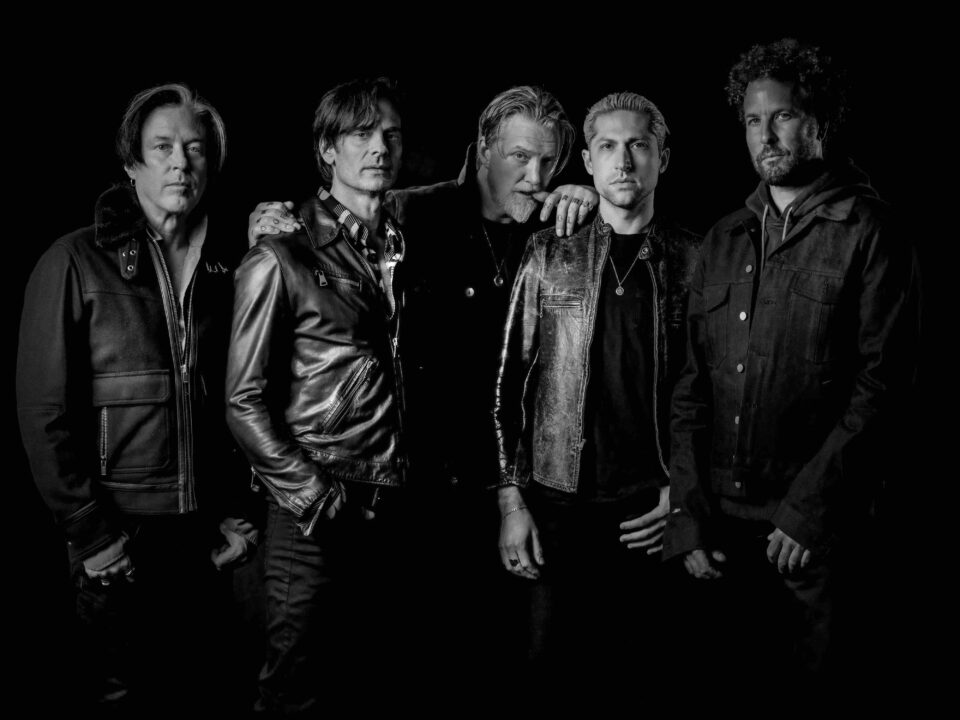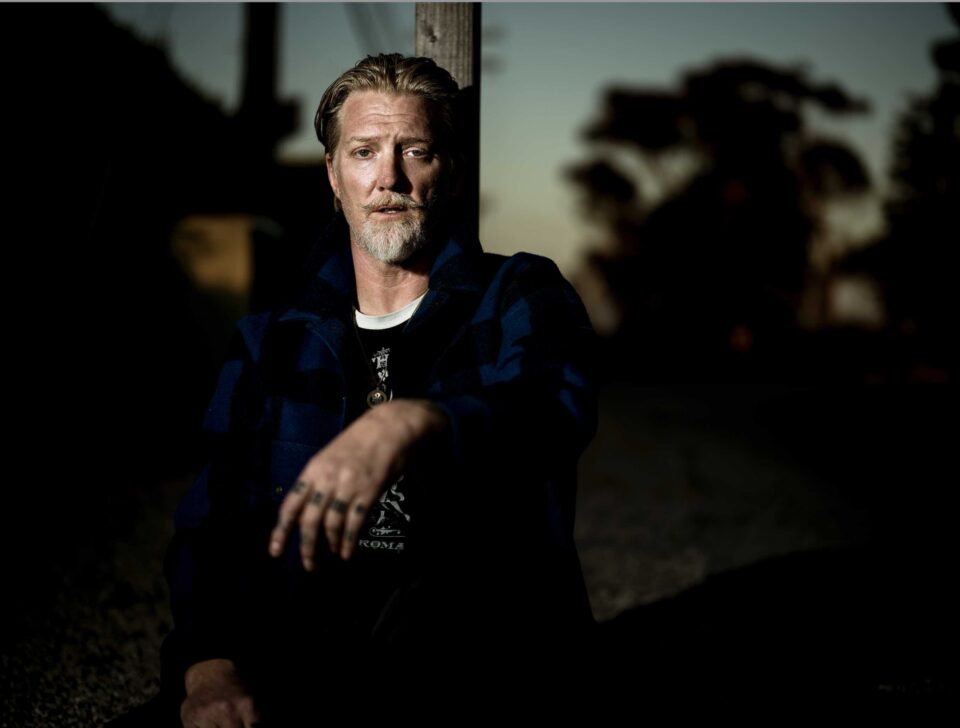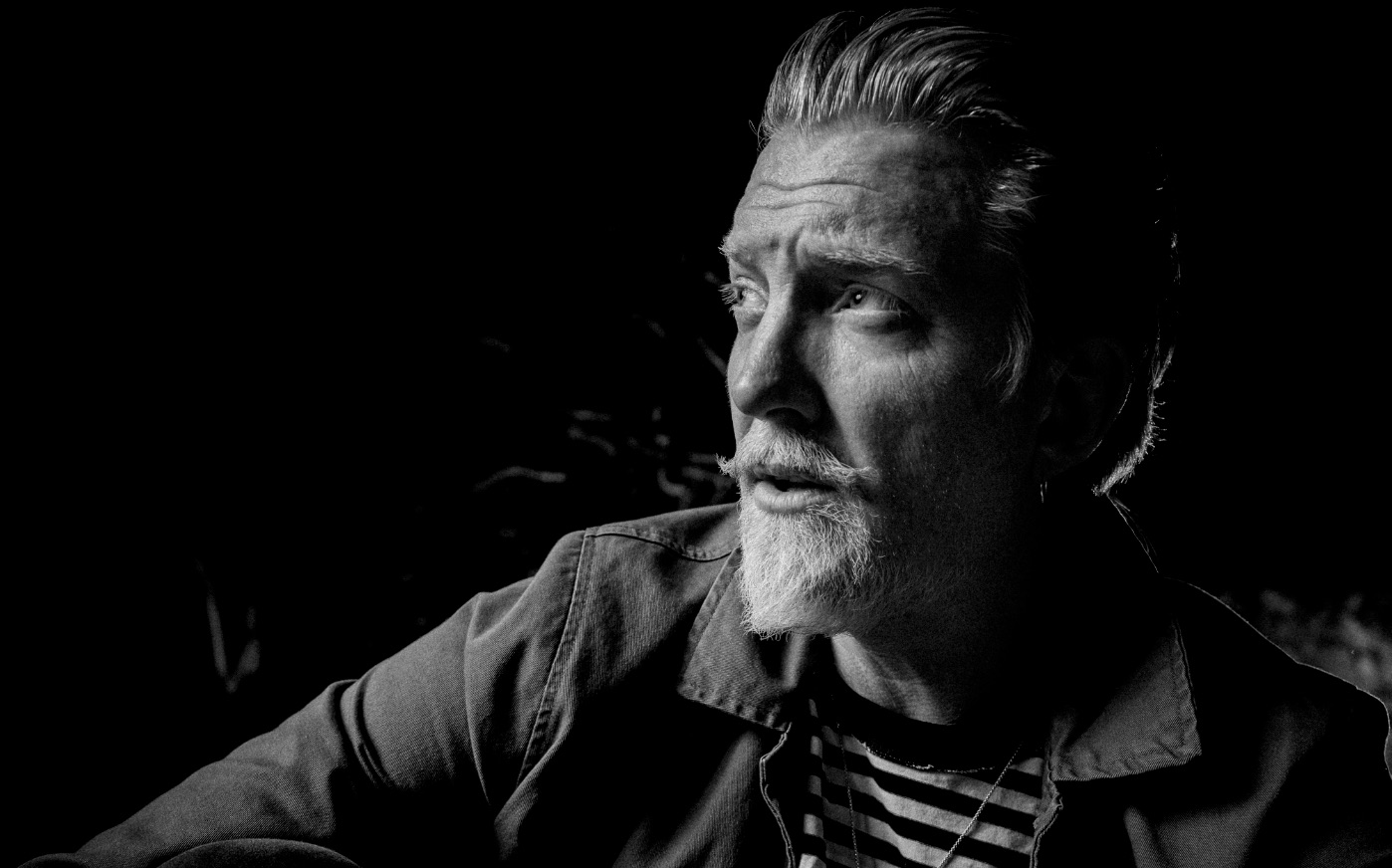Josh Homme takes a licking but keeps on ticking. Like clockwork, the Queens of the Stone Age frontman seems to face challenge after challenge, year after year—and always come out on top.
He cheated death due to complications from routine knee surgery. He lost many close friends far too early and tragically: Mark Lanegan, Natasha Shneider, and Anthony Bourdain among them. He became unlikely tabloid fodder amid a nasty custody battle with wife Brody Dalle, from whom he is now separated (Homme has sole custody of their children). He also recovered from cancer, engaged in highly publicized onstage incidents and physical altercations. Whereas most of us would have trouble rebounding after just one of those ordeals, Homme bounces back over and over again.
That’s not to say that the rough periods haven’t taken their toll on the man nicknamed “Baby Duck.” In a video interview conducted shortly before the release of QOTSA’s new album In Times New Roman…, Homme is sharp, wise, and witty as always—but also seemed to be transitioning into the role of elder statesman at times. Sporting graying hair and a beard, he speaks more slowly and deliberately than in previous conversations I’ve had with him. Declarations of gratitude, heartfelt words about fans and friends, and a more spiritual outlook on life also combined to make the interview more existential, serious, and revealing than ever before.
Dive into our conversation below.
How are you feeling these days? Amped about the new album and tour?
Oh, I’m really excited. I’m glad to get back to work. It’s been a long five years, and that’s all over now. This is a new beginning. It’s nice.
How was the transition getting back to work for you? Did it take time, or was it instantaneous?
It took a second. I don’t think we’ve ever had such a long gap between playing, so there’s still songs we’re getting familiar with. It’s like the muscle memory is taking a second. It turns out our music is actually hard to play!
I want to be in a band that can pivot, grow, change, do this, do that. And I don’t have to be in a new band, because that’s what Queens is: this group of people that’s agreeing, “Yeah, we can fucking do whatever we want as long as it’s real, as long as we believe it.” And that’s actually the most bitching thing possible to me.
Is that why you guys have only debuted two new songs live so far?
No, it’s because we’re dirty little bitches that like to leak out [new material] slowly. The process of putting out a record is fun because we’re playing cat and mouse with each other. I’ve really come to enjoy the process of emerging from the darkness. I love the fans, and so it’s fun to lovingly play dirty little tricks.
“I want to be in a band that can pivot, grow, change... That’s what Queens is: this group of people that’s agreeing, ‘Yeah, we can fucking do whatever we want as long as it’s real, as long as we believe it.’”
Which you’ve always done. You inserted hidden tracks before and after albums. You add in-jokes, references to past songs…
It brings great joy to figure out surprises like Easter eggs, puzzle pieces, breadcrumbs. If you’re someone who’s into music and not just listening on their drive-time commute, then that’s exciting. It also forges the relationship with us and our people—it’s like making art projects for them. From Michaels or JoAnn’s or a different craft store [laughs].

Speaking of QOTSA’s family tree, it appears you have fewer guests than ever before on your new record.
Yeah, the credits are simply the string section and [Arctic Monkeys drummer] Matt Helders. He’s got such an angel voice, and he happened to stop by. Because of the sonic brutality that we were gonna do, and the lyrical brutality that was gonna be laid out, this was really more us just conspiring by candlelight, and to include others would burst that fragile bubble. It really was about keeping everyone away.
The guys in my band, they’re so fucking good. They’re such assassins. They’re so overqualified, and on this record perhaps more than any is where everyone is representing themselves so well. Take “Paper Machete.” Troy [Van Leeuwen] created this sound that’s so gorgeous. We were trying to create landscapes and moods and emotional states of being that you can hear. And Mikey [Shuman] is fucking bananas. The whole [record] is driven by the bass. Everyone’s ability to step up at all times is really…I just appreciate it so much. I always think when I’m the worst musician, then we’re gonna be in a good spot. And that’s kind of where we are. I’m the untrained polka player, and the rest of these guys are just fucking destroying.
You didn’t even bring in [multi-instrumentalist/producer] Alain Johannes, who’s contributed to all previous QOTSA releases.
Al’s been traveling and doing exactly what he should be doing. He’s being a troubadour, simply moving through Europe on his own. Stopping at friends’ houses, performing. Can you imagine if Alain was busking somewhere, like at the Paris train station? That motherfucker would make, like, $10,000 in a day, right?
“Acceptance is the real key to this whole record, because that’s been the key to my last five years. I’ve been in a lot of situations where it doesn’t matter if you like it or not, it’s happening.”
I interviewed him last year and he had this to say about working with you: “If [Josh] didn’t keep me busy with Arctic Monkeys, Them [Crooked] Vultures, and Sound City, I would’ve had a very different paradigm in place.”
You know, when everything’s going well, you’re just hanging out with someone—and that’s very easy, right? And when things go terribly wrong, you really get to know somebody. And it’s been my privilege to get to know Al in these difficult moments. That’s what friends do.
And friends are really important to you. You had “Fairweather Friends” on …Like Clockwork, and at one point on the new album you sing, “Friends close, enemies closer.” Do you value your friends as closely as family members?
Well, we are [family]. You can’t pick your family, but you can pick your friends. And so when you do pick your friends, consider it. There’s all these colloquialisms, like “one bad apple spoils the bunch.” I always think, “Well, not if you grab the apple and fucking throw it from the cart.”
You have an endless supply of clever puns. Was that the case when you were a kid, too?
My mouth has been getting me in various states of trouble since I was very little. I was always fascinated with words. And I think English is so beautiful because it adopts words from every other language and just says, “Mine.” I think in today’s day and age, we’re too busy deconstructing words instead of using ’em for their real definitions—which is a shame, because it took thousands of years to create these definitions of, “I’m frustrated,” “I’m pissed off.” We misuse words all the time.
Louis CK said in his Hilarious special that we reach for the top shelf every time we want to express any emotion verbally. Common sense isn’t common sense anymore, it’s “genius.”
I love that bit. He’s such a smart and funny guy. I look to comedy as an inspiration for so much. I saw George Carlin when I was nine, and that changed my life. We were at the Desert Inn in Las Vegas with my grandparents. No one ever swore in my family, and we all went [to the Carlin show] and the look on my grandparents’ faces... I was like, “Wow, you can do this?”
“With each record, I take off one piece of armor and lighten the load of insecurity and fear. And now, I have no armor left. I have nothing to give but myself.”
He was the comedic master at deconstructing words.
Language was so important to him because communication is crucial to be understood or to understand someone else—it’s so rewarding to feel understood or to feel you understand someone else. And so I guess it’s comedy that’s really pushed my love of wordplay.
This seems like a good opportunity to segue into some of the lyrics on In Times New Roman… On “Negative Space,” which you’ve debuted live, you say, “We’ll never get back to where we were / Facing oblivion.” Is that a post-COVID reference?
I’m never really referring to COVID at any time. Acceptance is the real key to this whole record, because that’s been the key to my last five years. I’ve been in a lot of situations where it doesn’t matter if you like it or not, it’s happening. This record has a lot to do with the seven stages of grief, because I’ve experienced a lot of it. I’ve never learned so much in such a short period of time.
“I always think when I’m the worst musician, then we’re gonna be in a good spot. And that’s kind of where we are. I’m the untrained polka player, and the rest of these guys are just fucking destroying.”

This record is coming out after a period of trauma for you, as you’re saying. Is it a kindred spirit to …Like Clockwork, which dealt with your near-death experience?
I’ve always used music as my religion. I don’t have a therapist. Just playing makes me feel better. And if you put everything you have into it, you become a better person. You could unload baggage and you can figure out where or what your place is in this world.
I didn’t sing ’til last November, but the music was done two and a half years ago, and I just wasn’t ready. This is always deeply personal, but by the same token, it can’t be so personal that it’s too exact. I guess the scary thing I’m realizing is that people seem to like the records better when I’ve just gone through something fucking awful—which is not my favorite thing, but ultimately this is what the music is for.

If it’s any consolation, I think you’ve improved a lot of people’s lives over the years with your music. On the last three albums, your lyrics are much more direct, and fans often crave that authenticity. They can be assured the artist is coming from a real place.
In the beginning when you’re making music, you’re moving at the speed of inspiration. When I was younger, I had a different ego—what I would call “punk rock guilt” now. Like, “No one’s gonna get me.” And that’s really all just because you’re insecure and afraid to say what’s real. There’s lots of examples of me saying what’s real for me early on, but also I think [I was] sort of armored up. My grandfather used to say, “If you can’t outsmart ’em, out-dumb ’em.” I sort of took that as, “If you can’t outsmart ’em out, weird them [out].”
“The scary thing I’m realizing is that people seem to like the records better when I’ve just gone through something fucking awful—which is not my favorite thing, but ultimately this is what the music is for.”
There’s moments of deliberate oddness in order to protect yourself from what you really wanna say. And with each record, I take off one piece of armor and lighten the load of insecurity and fear. And now, I have no armor left. I have nothing to give but myself. The goal is to make my last record—whatever that is—my best one. And in order to do that, the only road worth going down is the one that’s vulnerable, where I admit that it’s hard and terrifying to make records. These records, for me, are getting more challenging. And it’s because there’s no tricks that can be played. It’s more about mining out what’s important and of value to me. It’s up to me to write the words and to pull all this together at the end. I take that seriously, but I don’t take myself seriously.
You mentioned “authenticity.” I used to hate that word—that’s for a barbecue sauce, like an “authentic” flavor. I understand now that it’s like what Carl Jung said, that uniting the shadow side with your light side and simply being who you are is authenticity. And I long for it in myself. So when we’re making music from that perspective, the music becomes extremely authentic. FL







